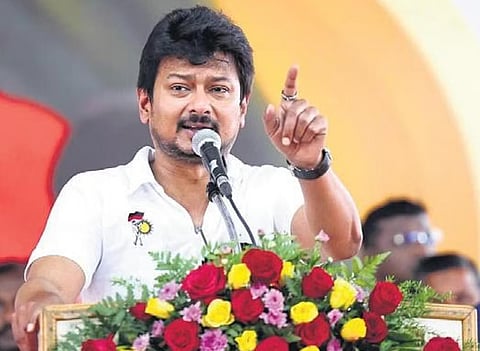

CHENNAI: Justice Anita Sumanth of Madras high court on Wednesday refused to issue quo warranto against Tamil Nadu Minister for Youth Welfare and Sports Development Udhayanidhi Stalin and Hindu Religious and Charitable Endowment minister PK Sekar Babu and DMK MP A Raja against their continuance in the public positions, following their remarks on Sanatana Dharma.
Disposing of the petitions filed by leaders of Hindu Munnani, the judge said that even though the writ for quo warranto is maintainable, no relief can be granted at this premature stage. However, she said, “People holding constitutional positions shall propound constitutional principles."
Equating Sanatana Dharma with HIV and Malaria is 'against constitutional principles' and such comments amounted to misinformation, the judge said.
She stressed that persons holding public offices shall show responsibility and make comments, like that on Sanatana Dharma, after going through 'literature' and 'historical facts'.
She said it was 'alarming' to note that the Minister for HR&CE was attending a conference on the eradication of Sanatana Dharma. The petitions were filed by Hindu Munnani office-bearers Manohar, Kishore Kumar and Jayakumar last year after Udhayanidhi made the comments at a Sanatana eradication conference organised by CPM's writers wing.
During arguments, senior counsels P Wilson, N Jothi and R Viduthalai, appearing for Udhayanidhi Stalin, Sekar Babu and Raja respectively, highlighted the right to free speech and the court’s limitations in deciding disqualification of legislators.
Referring to Article 25 of the Constitution, Viduthalai said the MP, through his condemnation of undesirable and unconstitutional facets of Sanatana Dharma, did not violate the provisions of the Constitution but rather promoted the constitutional precepts of equality, fraternity, etc.
He also emphasised that the ‘Doctrine of Separation of Powers’, propounded by the Constitution and recognized by the Courts in India, did not enable the High Court to unseat an elected member of Parliament or State Legislature by the issuance of a Writ of quo warranto, unless there is an anterior adjudication about his disqualification by the competent authority.
Similarly, Wilson submitted that prescribing the disqualifications for MPs and MLAs is the sole prerogative of the Parliament under Article 191 (e) and that the Courts should respect the separation of powers. He appealed to the court “not to transgress” into the exclusive domain of the Legislature and prescribe any additional disqualification.
However, senior counsel TV Ramanujam, representing one of the petitioners, said it is needless to go into the provisions of disqualification under Article 191 or the provisions of chapter 3 of Representation of People Act, 1951 to find an answer to whether the courts have powers to intervene in such situation under Article 226.
He contended that there is a void in the constitution in this regard. Hence, regardless of those provisions, the Court had wide powers under Article 226 to hold that this writ petition was maintainable and grant a writ of quo warranto.
The counsel sought the court to exercise its power and pass a declaration or direction to hold that Udhayanidhi Stalin’s action was ‘unconstitutional’.
G Rajagopalan, senior counsel, appearing for the petitioners, said the Minister heading the Hindu Religious and Charitable Endowments (HR&CE) must be professing Hinduism, and so, should not have participated in the conference. His presence in the event proved that he may not be professing Hinduism.
Another senior counsel G Karthikeyan, submitted that the declaration of Udhayanidhi Stalin to eradicate Sanatana Dharma is a fraud played upon the Constitution and necessary action had to follow.